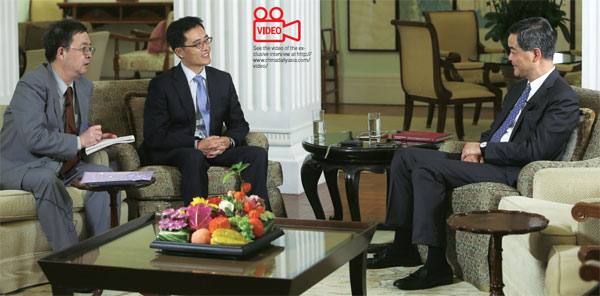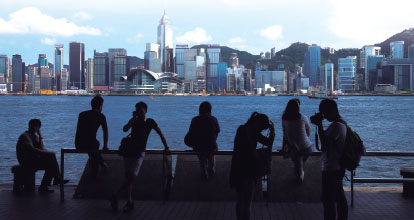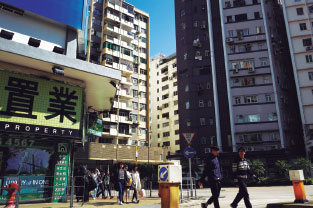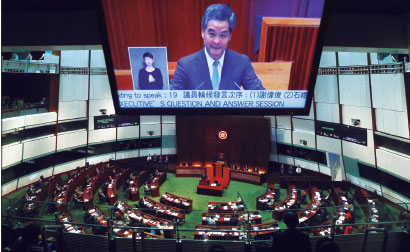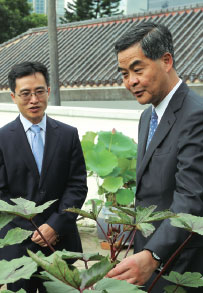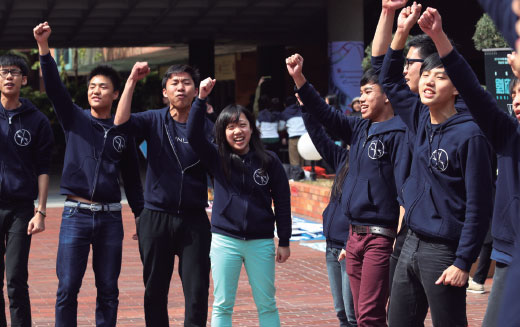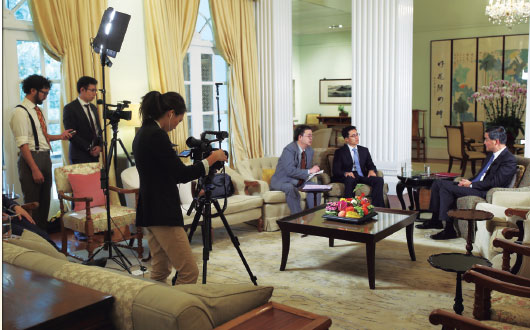Leung: HK needs to 'sharpen' its competitive edge
Updated: 2016-09-20 05:52
By Zhou Li and Joseph li(China Daily)
|
|||||||
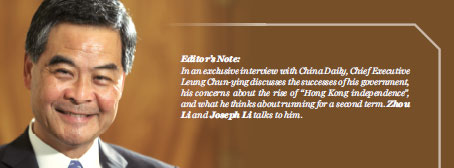
On work of the current-term government
Q:I remember when we first met about six years ago, you gave a very clear and thought-provoking analysis on the social divide and income inequality in Hong Kong, and its impact on the future of Hong Kong. I am wondering about the situation now, as you have been in office for five years. What measures and policies has your government implemented to improve the livelihood of Hong Kong people?
A:The social situation, in particular, the income gap in Hong Kong, has improved in the last four years, but the situation is far from being ideal. Still, there is a lot of work to be done in the future. If you look at the social welfare side of the work of the Hong Kong government in the last four years - in monetary terms - the annual amount that the government spends on helping the underprivileged in Hong Kong has increased by 55 percent since we took over. And together with the pro-employment policy that we have adapted in growing the economy, the employment income of the bottom 35 percent of the workforce has been increasing.
I think generally speaking the total income of the low ranks of the society has improved. But the situation is far from being ideal, particularly on the housing front. We all know that the biggest expenditure item of households in Hong Kong is housing. The costs of housing, whether the cost of ownership or the cost of renting a roof over one's head, are still too high. We are working tirelessly on this front.
|
Chief Executive Leung Chun-ying (right) talks to Zhou Li (center), a member of the editorial board of China Daily Group and the publisher and editor-in-chief of China Daily Asia Pacific, and China Daily reporter Joseph Li at the Government House last Thursday. Photos by edmond Tang, Roy Liu / China Daily |
You probably read yesterday (Sept 14) that in July, the number of housing units that were the subjects of application, namely developers apply to government departments to start their construction, was the highest in 15 years. And the total number of units under construction which will be completed in the next three to four years again is the record high.
So hopefully with more supply, we will be able to arrest the long-term trend of rents and prices going up. There is still a lot of work to be done. I know this is also the responsibility of the government, to wrap our minds around the question of the income and the quality of life of the middle-class in Hong Kong.
|
Tourists enjoy a view of Victoria Harbour. |
On 'Hong Kong independence'
Q:We all know that the "Hong Kong independence" has no future, but a number of people are promoting this concept which causes concerns among the Hong Kong society and the central government. What strategies and measures do you think the government should take to combat this trend?
A:Firstly, let me say that this is the view or the proposition of a very small minority of the Hong Kong society. By far the majority of Hong Kong people support "One Country, Two Systems", and the two systems within the same country, name it, our country, China.
But we shouldn't be complacent. If we did not tackle the problem, and tackle it well, it could spread. Hong Kong is an inalienable part of China. That's in the Basic Law. We obviously should point to this specific Article 1 of the Basic Law which says that Hong Kong is an inalienable part of China. I think we should do some more public education in Hong Kong.
I just read a letter on the South China Morning Post this morning (Sept 15), for example. The letter basically said we can amend the Basic Law because there is an article that allows the amendment of the Basic Law. But the writer of the letter probably missed paragraph four of Article 159 which deals with the amendments of the Basic Law. Let me read it up for you. It says no amendment to the Basic Law shall contravene the established basic policies of the People's Republic of China regarding Hong Kong. And of course one of the basic principles is Hong Kong is an inalienable part of China.
A lot of people do not realize this, so again partly this is the duty of the Hong Kong government to make sure people understand not just one or two articles of the Basic Law, but all articles of the Basic Law.
Some young people also claim that we should now prepare for the possibility of Hong Kong being in one way or another, detached from the rest of the country in 2047. As far as the "One Country" aspect is concerned, 2047 is a non-event, because 2047 is obviously 1997 plus 50 years, and the reference to the 50 years in Basic Law is in Article 5. It says that the socialist system and policies shall not be practiced in the Hong Kong Special Administrative Region, and the previous capitalist system and way of life shall remain unchanged for 50 years. So it is the capitalist system and the way of life in Hong Kong that shall remain unchanged for 50 years.
So after 50 years in 2047, strictly speaking, in theory, the capitalist system and way of life could change. My view is that we don't have to change that, because this "One Country, Two Systems" serves Hong Kong well today, and will in 2047 and thereafter. This article doesn't say in 2047 the "One Country" aspect can be changed. So in 2047, we will carry on with "One Country, Two Systems".
There is a good deal of misunderstanding among the young people about the provision of the Basic Law and therefore the constitutional arrangement between Hong Kong and the country. Of course, I don't rule out the possibility of people who understand the Basic Law but calculate to mislead.
Q:You just mentioned that 2047, but there are some concerns, as reflected in the press already, about the future of Hong Kong. So how do you assure them that there will be no change?
A:We do not need another millstone around our neck. It wasn't that long ago that we dealt with 1997. I helped draft Annex Three to the (Sino-British) Joint Declaration in 1984 that dealt with the subject of land leases in Hong Kong, primarily those in the New Territories, with the date of June 27, 1997 as the expiry date. As far as land lease are concerned, we have plenty of good experiences of dealing with that, and there is a simple promulgation in the Joint Declaration that actually dealt with it, basically amounting to an extension by 50 years.
It is useful to note that we will be granting 50 years leases that expire beyond 2047. Leases the way you read about the paper this morning the Lands Department just granted a lease to the highest bidder in a land tender exercise, selling a piece of land in Sha Tin. Now that lease term is for 50 years, expiring in 2066, not 2047. So these are good and strong indicators as what Hong Kong would be like beyond 2047.
Q:Can you tell whether it is the central government's bottom line not to allow people to talk about "independence" in Hong Kong?
A:Hong Kong is an inalienable part of the country. We don't need any bottom line from the central government, to know that Hong Kong is, and shall remain as part of China this side or the other side of 2047.
There was a lot of discussion about whether school students should be allowed to discuss this. My view is it is a simple fact, a constitutional fact, and it is a clear legal provision of the Basic Law that Hong Kong is part of China. So there is no room for discussion really.
And if students wanted to discuss this aspect of the Basic Law, then it is very much up to the teachers in the schools to guide the students, by pointing out for them the provisions of the Basic Law.
I know we all cherish freedom of speech, and freedom of expression in Hong Kong. But expressing a view is very different from promulgating certain beliefs and actions. Particularly in schools, there are certain things that schools do not encourage, and do not allow school students to discuss - matters that are illegal, immoral are basically out of bounds in schools.
Q:Should the Education Bureau issue any guidelines to schools as to such discussion in schools?
A:It is such a clear fact that I don't think the Hong Kong government or anyone else needs to provide any guidelines. I mean if anyone wanted a guideline, he only needs to turn to the first page and the first article of the Basic Law to find the guideline.
Q:It has been suggested that call for independence has arisen because of discontent among young people or because they are anxious about the future. What should the government do to help improve these perceptions?
A:Firstly as I said, we shouldn't be complacent. We should explain the provision of the Basic Law, and why it is not realistic for Hong Kong to be somehow independent, or detached from the rest of the country.
But at the same time we shouldn't generalize the views or propositions of a very small minority of the population in Hong Kong, a very small minority of the student population in Hong Kong. And I wouldn't want to attribute the views of a very small minority to the manifestation of some social issues.
On the possibility of running for a second term
Q:Many people are very concerned over whether you are interested in running a second term When will you tell us that you will be running for a second term?
A:When I have decided and I will make the announcement accordingly.
Q:In general terms, what are your considerations in running or not running?
A:I'll share that with the people of Hong Kong at the same time, too.
|
Pedestrians walk past a real estate agency in Mong Kok. |
Q:You took part in the 2012 election, it was a contested election. Are you happy to debate with other candidates?
A:Of course. I don't mind any contest. And the people in Hong Kong are entitled to know the policies of people who want to lead Hong Kong government. I haven't heard any from anyone so far, I am not saying that I shall run. As I said, I would like to emphasize this. I shall make the decision in due course and announce the decision as soon as I have done so.
But people know my policies. People know where I stand when it comes to housing. They know where I stand when it comes to growing the economy, and they know where I stand when it comes to helping the poor, the underprivileged and so on. They know where I stand with regard to health care, the environment and so on. And actually, I have done a fair amount of work in all these areas in the last four years. I think the people are also entitled to know where aspiring candidate stand on these matters.
On the question of housing, we need to increase supply. We need to manage down and possibly manage out, non-occupational demand, namely people who buy housing units not for occupation purposes. These include basically speculative demand, investment demand and outside demand, meaning demand coming from people outside of Hong Kong. Now, we have been able to manage down all three demands. Lately, the investment demand has been increasing and we need to address that as well. So, we have been doing work on both supply side and demand side.
There was a recent survey to show that the housing market in Asia Pacific generally increased by 5 percent last year, but the housing market in Hong Kong came down by 8 percent a year. I know people in Hong Kong might prefer to see a larger reduction in prices and rents than 8 percent. But it really goes to show that if the Hong Kong government didn't do anything, instead of prices going down (by 8 percent in Hong Kong), you probably would see on average, and this is the average Asia Pacific figure, an increase of 5 percent. So that's housing.
Poverty, I mentioned, whether it is Old Age Living Allowance, because we have old age poverty in Hong Kong, or other subsidies and allowance we put in places in the last four years, I think they have been helpful for people have been suffering from poverty.
|
Chief Executive Leung Chun-ying at a question-and-answer session in the Legislative Council in 2015. |
The environment. Air quality is now much better. We don't hear from the expatriate community or foreign chambers of commerce in Hong Kong about the poor air quality in Hong Kong being a drag on the investment or the recruitment of people coming to Hong Kong to join them.
So these are the policies that this government put in place, implemented and have seen the results of. And it is important for aspiring candidates, to actually tell people that what you want to do for Hong Kong. Now so far, I have not come across anything from such aspiring candidates.
Q:So these are your policy platforms for the new term?
A:No. I said I'm not decided. Therefore, I am not making any announcement.
On executive-legislative relations
Q:What do you think of the results the just concluded Legislative Council election? Quite a number of new faces, young people were elected into the legislature, especially some who claimed to be coming from localism and self-determination groups. How are you going to deal with these young lawmakers?
A:We want to engage them. And I think it is interesting to note that of the 27 "pan-democrats", 12 are leaving LegCo, as a result of either retirement or losing the election. And 12 out of total 27 is a high percentage and some of these vacancies are being filled by young faces.
We welcome young people joining the legislature. We like to maintain and we, being the government, try as hard as we can and strike a working relationship with each of the members of the LegCo and with LegCo as a whole. Therefore, (I have sent) invitation to all members to meet, to talk about matters of mutual interest and mutual concern, and to talk about the work of government and the LegCo in general.
|
Chief Executive Leung Chun-ying shows the vegetation at the garden of the Government House to Zhou Li. |
I believe at least some of the votes that would have gone to the traditional "pan-democratic" camp candidates did not go to them, and went instead to the young candidates. I think it said something about the performance of the outgoing "pan-democratic" LegCo members. But as I said Tuesday last week (Sept 6), the people have spoken. We respect the choice, the collective choice of the voters. We try as much as possible to work with the entire legislature.
Q:You tried to offer them an olive branch, but some of them gave you the cold shoulder. They refused to join the National Day reception.
A:That's politics. And there could be some grandstanding; there could be some politicking on their part. I think they realize, as much as everyone in Hong Kong does, that the government has work to do and the expectations of the public of the performance in LegCo. LegCo cannot function on its own without the government.
Q:The latest situation in LegCo is that it is almost divided into three blocks - apart from the pro-establishment lawmakers, there are the traditional "democrats", the radicals, and the localism groups. It is quite a difficult situation to manage, and how do you ensure that you can maintain a working relationship with them?
A:We don't know yet. It is not for me to say, I think all I can say and all I can do is that the government will bend over backwards, to win over as many Legislative Council members as possible, and to work with them in a constructive way as possible.
Q:Would you say that the filibuster will continue in the new term? We have encountered a lot of painful experience over the last year or two. Many bills were gunned down by filibuster.
A:I hope not. The people who filibuster should know that filibustering is not a privilege of any sector, or segment of the Legislative Council. I'm sure we don't want to see filibustering spread. If one or two members of the Legislative Council resort to filibustering to stop a bill, such as the Medical Registration (Amendment) Bill, going forward, and one or two LegCo members who belong to other camps, could also resort to similar filibustering tactics to stop other things from going through. The LegCo members, for example, representing commerce industry, representing employers in Hong Kong, could resort to it to stop, for example, a pro-labor, pro-worker initiative going through the LegCo. We don't want to see that. Filibusterers should realize that it is not their singular privilege.
Q:In the coming months, will the government take any major proposals to the LegCo? Or will it leave it to the next government?
A: No, no, no. We shan't leave anything to the next government. It would be very sad day in Hong Kong if my government took a short-term view and initiate bills and new policies that would only cover the period ending June 30, 2017.
|
Students rehearse a performance at the Hong Kong Polytechnic University. |
On social mobility for young people
Q:With the social mobility for young people slowing or even coming to a standstill as reported in some press, society and the government should do something. What are your suggestions?
A:The structure of the economy and the competition among young people today, particularly among young graduates or young people with university qualification, are very different compared to the days for example when I just graduated. A much higher percentage of the young people in Hong Kong are university graduates. So competition amongst graduates is keener as compared to 30, 40 years ago. But 30, 40 years ago, competition was at the university entrance stage. Competition for university places was fierce in those days. So we are looking at pretty different situations. In those days, if you wanted to achieve social mobility in Hong Kong, you competed within Hong Kong.
But today we provide opportunities outside of Hong Kong as well. Hong Kong has a large extended economy outside of the 1,100 square-kilometers of Hong Kong's land area. We have a large extended economy not only on the Chinese mainland but also in other parts of Asia, in the ASEAN countries, for example. So it is up to the young people also to look for and realize their opportunities outside of Hong Kong.
These are not official statistics. But we have been asking Hong Kong chambers of commerce in Beijing, Shanghai and Guangzhou and the total figure given by the three chambers is 350,000, namely 350,000 people who work in these three cities on the mainland on a permanent basis. And 350,000 is pretty much 10 percent of Hong Kong's workforce.
And this represents mobility, not just in geographical mobility, but also social mobility. The opportunities for them in mainland must be reasonably good or better than opportunities in Hong Kong for them to relocate. We are seeing a growing Hong Kong expatriate population in South Asian countries.
So my advice to young people in Hong Kong is that: one, we should support economic development in Hong Kong, because without economic development, there will not be additional places in the upper echelons of the employment ladder. Secondly, support the Hong Kong economy outside of Hong Kong and also look for opportunities outside of Hong Kong as well.
If you look at the competition of the expatriate population in Hong Kong, we have a lot of Americans, British, Japanese, Australians and Canadians working in Hong Kong. Their countries are pretty well and highly developed economies as well. So why would they come to Hong Kong? Because Hong Kong offered these expatriates better employment or career prospects. So they are here. And all economies that are competitive, including economies that are highly developed, have a sizable population of expatriates outside their home base.
No matter how fast we develop the local economy, the rate of growth of the economy and therefore the number of places among higher ranks of our employment ladder cannot grow as fast as the growth of university education sector.
So people should be encouraged to look elsewhere. The Hong Kong young people I visited whenever I traveled outside of Hong Kong have been able to grab the opportunities not only on the Chinese mainland but also in places like Malaysia and Indonesia. This comes as a policy of calling on Hong Kong students and Hong Kong people living, working, and studying outside of Hong Kong, whether in mainland cities, American or European cities.
So in my travels and in the travels of my senior colleagues, we meet up with Hong Kong students and Hong Kong young people. And more and more Hong Kong people live and work overseas, not necessarily because Hong Kong's prospects are not good, but because the prospects outside Hong Kong are, for their purposes, better. And therefore they are outside of Hong Kong. And I think we should not ignore opportunities outside Hong Kong. We should not ignore these opportunities as the government, as a community or as individuals.
And that's why we have been asking our economic and trade offices to represent Hong Kong government and represent Hong Kong to stay in touch with local Hong Kong people, so we can do as much as we can to provide the necessary assistance.
On future directions for economic growth pattern
Q:I have another question about the growth model or the growth pattern. You know that the G20 just concluded last week. And the concept of innovative, collaborative, inclusive and integrated economic growth pattern has been promoted among members. A columnist of China Daily has called for Hong Kong to look for improvements in the innovative growth pattern and also the repositioning of Hong Kong in the global economic governance. May I have your views on this?
A:Yes. We need to sharpen Hong Kong's competitive edge by including innovation and technology in our economic activities. And it is not just on the manufacturing side, of making things with a higher content of technology and innovation, but all told, financial service, for example, fintech, smart city, using innovation and technology in our public transportation sector to make public transport safer, more competitive and more convenient.
So, we are going all out to embrace innovation and technology and that's why in November last year, after two failed attempts, failed with the filibustering, we finally established the Innovation and Technology Bureau. We are pleased to say that in the last ten months, it has gained very good traction in Hong Kong. The business sector is excited about the prospects, and it is important to get the business sector excited because after all they are the people who actually create the economic activities, not the government.
Hong Kong people are not just talkers. Hong Kong people are doers. Many of them have been very successful, with or without the government, I have to say. In embracing technology and innovation, I'm very pleased to see this development.
What I have been doing and I think also recently successfully is to encourage universities to connect with the business sector, because so far, most of our R&D activities and most of our R&D spending are inside universities. We want to make sure in addition to the primary research, we don't want to get rid of all the primaries, but in addition to primary research by researchers in universities, who are by large funded by the government, we will also do application research.
|
China Daily's video team captures the exclusive interview with Chief Executive Leung Chun-ying. |
(China Daily 09/20/2016 page8)
